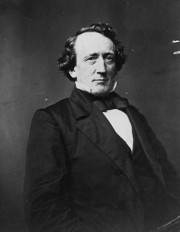1847 Ojibwe Land Cession Treaties
Chippewa of the Mississippi & Lake Superior Signed August 2, 1847 in Fond du Lac (Duluth), Minnesota
Pillager Band of Chippewa Indians Signed August 21, 1847 at Leech Lake, Minnesota
In 1847, Ojibwe-Dakota relations were more significant to American Indians in present-day Minnesota than were U.S.-Indian relations. In these treaties, the Ojibwe ceded land to create a buffer zone that would separate them from the Dakota. The ceded tract, used jointly by the two tribes for hunting increasingly scarce game, was a place of frequent conflict. In a four-way deal, the U.S. purchased the land from the Ojibwe and ceded it to Ho-Chunk and Menominee people. At the first of these treaties, which set the terms for both agreements, the Ojibwe were represented by Henry Mower Rice, an ambitious politician who had built trust with the Ojibwe through the fur trade.
This idea had been tried before when the Ho-Chunk had acquired a buffer zone between the Dakota and Sac and Fox (see Multinational Treaty, 1830). Its miserable failure is described by M. L. Wingerd in North Country:
"Since conflicts among the tribes were most often precipitated by a contest over scarce resources, it seems unimaginable that government policy makers did not foresee that adding another population to the region would only replace one set of combatants with another."
Based in part on this experience, the Menominee and Ho-Chunk peoples never moved to the land ceded in 1847, and eventually it was ceded by them back to the U.S.
Another notable feature of the first of these two treaties was an article stipulating that “the half or mixed bloods of the Chippewas residing with them shall be considered Chippewa Indians, and shall, as such, be allowed to participate in all annuities.” Many of these individuals were traders who worked for fur companies or the U.S. government. As Anton Treuer notes in The Assasination of Hole in the Day, one factor behind this article was the obligation it created among the traders to Hole in the Day, the lead Ojibwe negotiator.









